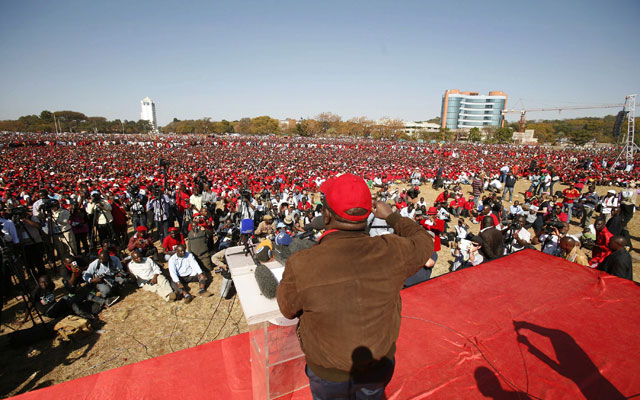Sadly, history has a tendency of repeating itself in Zimbabwe. Once again, while Robert Mugabe’s regional friends have accepted the Zimbabwean elections, the West has deemed them deeply flawed.
Unlike the violent 2008 election, last week’s balloting in Zimbabwe was largely peaceful. This led many African governments—in addition to the African Union and the Southern African Development Community (SADC)—to declare the elections to be free and fair. South Africa’s president, Jacob Zuma, sent Mugabe his “profound congratulations” and declared the election results to be credible.
However, peaceful elections are not necessarily free and fair elections. There is extensive evidence that voter rolls prior to the election were manipulated and election tallies tampered with after the election—both likely designed to give Mugabe a large victory and his political party, Zimbabwe African National Union-Patriotic Front (ZANU-PF), sufficient parliamentarians to govern and change the constitution as they wish. Unlike in 2008, Mugabe did not have to resort to violence, because the fix was in well before the election.
Botswana appears to be the only country among the regional players that sees things clearly. Botswana has declared that conditions for free and fair elections in Zimbabwe did not meet the SADC requirements and that the SADC “should not create the undesirable precedent of permitting exceptions to its own rules.”
Thankfully, Western countries are not falling for Mugabe’s election ruse. U.S. Secretary of State John Kerry condemned the elections in Zimbabwe as “deeply flawed” and not representing “a credible expression of the will of the Zimbabwean people.” British Foreign Minister William Hague likewise expressed “grave concerns” about the election. Australian Foreign Minister Bob Carr called for new elections to be held.
The U.S. should prepare to take the next steps. As we’ve recommended, the U.S. should “strengthen sanctions if the electoral process is not deemed credible” and should also seek to “engender complementary sanctions…particularly in Europe.”
These next steps should be taken expeditiously to send a clear message to Mugabe and ZANU-PF that the U.S. will remove sanctions against individuals or entities in Zimbabwe only after free and fair elections are held.
Mugabe’s manipulation of the electoral results will only undermine what little progress was made over the past few years with the power-sharing agreement. The Zimbabwean people deserve more than sham elections; they deserve a representative government.






























